Search
Showing 10 of 1954 results for NARSC 2016 conference registration fees student pre advance late July 2016
-
E-News content refresh coming soon
The E-News content refresh is the outcome of ENZ’s review of analytics over the past year. This has demonstrated our readers’ strong preference for forward-looking market insights and intelligence updates.
By tailoring the newsletter content to audience preferences, ENZ will be able to deliver a sharper, more insightful E-News to the international education sector.
ENZ’s General Manager – Stakeholders and Communications, John Goulter, said that ENZ is keen to offer more value through E-News, which is ENZ’s main industry-focused channel.
“We want to ensure we’re using E-News to truly help international education thinking and deliver better value to industry,” John said.
“With the new format, we will aim to share more market insights and updates from our International team and other sources, and articles on trends, new initiatives, research findings and other intelligence to help industry make informed decisions on marketing, student experience and adapting to the rapid pace of change in international education globally.”
The changes mean that from August onwards, we will publish E-News monthly instead of fortnightly.
The final fortnightly E-News issue will be published on 31 July, followed by a monthly issue starting the week of 19 August.
-
Otago strengthens its engagement with China
The agreement with Nanjing Medical University will see increased engagement between the two institutions in research as well as staff and student mobility, starting with a Nanjing Medical University delegation visiting the University of Otago later this year.
University of Otago, Deputy Vice-Chancellor – External Engagement, Professor Helen Nicholson said Nanjing Medical University was a well-respected and internationally recognised institution.
“We are looking forward to building strong academic, research and mobility links with them, with a focus on pharmacy and the wider health sciences.”
Professor Nicholson and Director International, Jason Cushen, travelled as part of the Dunedin City mayoral delegation to mark the 25th anniversary of Dunedin’s sister city relationship with Shanghai, as well as to hold alumni events in Shanghai and Beijing to celebrate the university’s 150th anniversary.
The Shanghai visit involved the University of Otago and Dunedin City in a number of events including a meeting with the Mayor of Shanghai on 15 July, a formal Shanghai City welcome banquet, and meetings with key education institution partners including Fudan University, Shanghai Jiao Tong University and the University of Shanghai.
“We marked these important milestones and honoured our sister-city relationship with a number of events held in conjunction with the mayoral delegation. The strong relationship between the University of Otago and the City of Dunedin is an important factor in the University’s engagement with Shanghai and greater China,” said Professor Nicholson.
-
New Zealand and international secondary students to grow cultural competence skills together
Qualitative research[1] from ENZ concluded that New Zealand businesses who employed staff with cross-cultural competencies found this contributed to a more energising workplace, which helped to foster creativity and innovation as well as other benefits.
The employers agreed cross-cultural competence was a sought-after skill when hiring staff, leading ENZ to fund the programme for more high school students around the country.
Grant McPherson, Education New Zealand’s Chief Executive says, “The insights from New Zealand businesses around the benefits of cross-cultural competencies within their teams have been one of the key reasons we’ve taken this initiative to help grow cultural competency, providing an alternative to international school exchange experience while borders are closed.”
This work supports the third goal of the New Zealand International Education Strategy 2018-2030 to develop global citizens within New Zealand and aims to help both students and teachers develop their cross-cultural skills together with their global peers.
ENZ and Massey University first partnered with the American Field Service (AFS) in July 2020 to launch a pilot of the NZGCC programme. The virtual programme delivers animated videos, quizzes, assignments and weekly live facilitated dialogue sessions for local and offshore learners to talk with each other online in real time.
Following the success of the pilot, ENZ today announced a further $380,000 investment to subsidise the cost for 321 New Zealand and 486 international learners to develop cultural self-awareness, empathy for other cultures, emotional resilience and ways to build bridges in multicultural settings.
18 online modules cover topics such as stereotypes, empathy, dealing with conflict and resilience, and will be delivered to international learners from India, China, Japan, Vietnam, Thailand, the Republic of Korea, Indonesia, Brazil, Mexico, Colombia, Peru and Chile.
The newest students to benefit from the NZGCC programme are Whanganui Girls College, Cullinane College, Whanganui High School and Awatapu College pupils. Starting today, 23 Whanganui and Manawatu students will partake in a virtual learning exchange with 20 high school students in Tokyo, Japan, in a partnership with the Tokyo Board of Education.
Whanganui Girls College principal Sharon Steer says the new programme will help students build their understanding of global cultures – critical ‘soft’ skills that will also prepare them for life after high school as they enter the workforce.
“An important part of our curriculum is developing strong communication skills and setting our students up for success in the workplace. The NZGCC programme will add another dimension to our lessons by teaching our students how to develop meaningful relationships with one another despite language and cultural differences,” said Steer.
“This allows our students to connect with peers in Japan and learn more about their culture without having to get on a plane when international travel remains limited.”
In addition to secondary school students, the NZGCC programme will support teachers in indigenous communities in Pacific Alliance countries, and people undertaking English language and teacher training in Indonesia, Vietnam and the Republic of Korea.
Around 100 students from decile 1 to 5 schools across New Zealand will be offered NZGCC scholarships to participate in a virtual exchange with their peers in Asia.
ENZ’s Chief Executive Grant McPherson said the programme’s expansion is a key part of diversifying education in new virtual forms fit for a globally connected world.
“We’re pleased to continue our support for the NZGCC programme to bring New Zealand and international learners together in a virtual environment to gain the skills needed to live, work and learn globally.
“As well as helping to develop the global citizens of tomorrow, this programme demonstrates the reciprocal benefits of international education, giving our rangatahi a chance to learn with high school students from around the world, and giving their offshore peers a chance to learn ‘with’ New Zealand and our unique way of thinking.”
More information about the NZGCC can be found here: https://www.globalup.com/
ENDS
[1] https://intellilab.enz.govt.nz/document/583-employer-perceptions-of-hiring-international-graduates
Notes to editor:
- Education New Zealand is the government agency responsible for building international education to benefit New Zealand socially, culturally and economically. For more information, visit enz.govt.nz
- Developing Global Citizens is the third goal of the New Zealand International Education Strategy 2018-2030.
- Education New Zealand has a focus on developing global citizens within New Zealand, so that more learners gain the knowledge they need to live, work and learn globally.
- The Global Competency Certificate (GCC) is a research backed programme teaching cultural self-awareness, empathy for other cultures and ways to build bridges in multicultural settings. It is designed by American Field Scholars (AFS), a global non-profit internationally recognised as leaders in Global Citizenship.
- In 2020, Education New Zealand partnered with Massey University and American Field Scholars to deliver a customised version of the GCC programme to New Zealand students and international students in New Zealand and abroad.
- One Palmerston North student who completed last year’s pilot summarised the experience as ‘eye-opening’: “The main takeaway was the ability to see life from different perspectives to our own, to understand how different cultures, experiences and beliefs can impact others. Being part of this course has truly opened my eyes to some of these viewpoints and I’ve learned to embrace them with an open mind.”
Media contact
Hazel Dobbie, ENZ Director Communications
Hazel.Dobbie@enz.govt.nz 021 579 917 -
Digital skills and global citizenship at #NZAsiaTech Code Camp
A team of six students from Te Kura Māori o Porirua, a predominantly te reo Māori medium school in Porirua, interacted with school students in Japan, South Korea, Thailand, Viet Nam, Philippines, Malaysia, and Indonesia.
The overall theme was tourism, seen through the lens of the United Nations Sustainable Development Goals (SDG) - a theme that is highly relevant for the Asia-Pacific region. Students were given the task of profiling their home country’s SDG initiatives, with a focus on sustainable tourism.
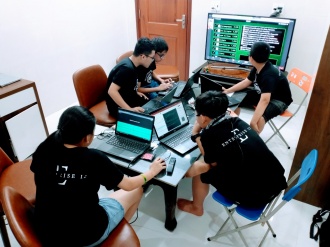
Team Enterprise 12 from Viet Nam work on building website project during #NZAsiaTech Code Camp
The North Asia Centre of Asia-Pacific Excellence partnered with educational coding programme Code Avengers and Education New Zealand Manapou ki te Ao to deliver the event.
“With New Zealand’s borders having been closed for more than two years, it’s crucial that the next generation of students still have opportunities to build cultural competencies and make connections across the globe,” says Education New Zealand’s Regional Director for Asia, Ben Burrowes.
“The #NZAsiaTech Code Camp was an opportunity for Kiwi students to re-establish connections with students in other countries, while gaining critical digital skills to prepare them for the future.
“It also also gave a taste of New Zealand’s education offering to prospective international students from the Asia region, who might consider enrolling in high school or tertiary study in New Zealand in the future.”
Code Camps can help to generate subsequent visits by interested students to New Zealand. For example, the Code Camp held at Waseda Jitsugyo School in 2021 and at Waseda University Junior and Senior High School in 2022 has led to Waseda’s group students’ programme sending around 50 students from three schools to New Zealand for three weeks in March 2023. Code Camp served as a great opportunity for students and teachers from Waseda University affiliated schools to experience our world-class digital education first-hand.
Honam Jeon, the Education Manager at Gangwon International Education Institute said the programme helped increase awareness of New Zealand:
“South Korea is very interested in international engagement and exchange programmes for school students. The #NZAsiaTech Code Camp was a perfect example we want to continue to join. Thanks so much again to ENZ for organising the well-structured programme.”
The online programme included team building exercises, English learning, HTML coding lessons, and the creation of a website by student teams, to demonstrate their understanding of the importance of sustainable tourism.
“As our students look to enter an increasingly globalised word, developing cultural connections and transferable skills is so important,” says Te Kura Māori o Porirua school principal, Whāea Evelyn Wharehinga.
“The Code Camp has been an exciting growth experience for our students, who have extended their digital literacy skills while having the chance to connect with students of different ethnicities and cultures across the Asia-Pacific region.”
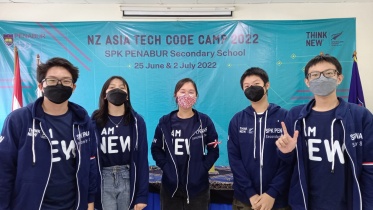
Team Indonesia was the winning team after presenting their newly developed website on Sustainable Tourism to a virtual panel of judges.
The students presented their sustainable tourism-themed websites to a panel of expert judges at the awards ceremony on 2 July 2022, with students from Indonesia winning the top prize.
Steve Budd of Code Avengers, a global edtech company based in New Zealand, said it was a great programme to participate in.
“It was a privilege to gift all participants a one-year free subscription to the Code Avengers site as part of our mission to build lasting digital capabilities for educators and young people, and bridge the digital divide,” says Budd.
-
From the CE: Steady progress continues
Since New Zealand’s borders reopened at the end of July I am pleased to note that we are making steady progress, although this can’t yet be fully quantified. The number of students with valid student visas who are in New Zealand is heading in the right direction, reaching 16,515 as at 16 October 2022. It’s important to note that these statistics are only part of the story. Students who travel to New Zealand for short courses of study from visa waiver countries or on working holiday visas aren’t included. It will be some time before reliable statistics are available on the total number of international students enrolled with New Zealand education providers this year. Anecdotally, though, we are hearing from schools, and from English language providers and others across the sector, that they are seeing gradually increasing numbers of international students enrolling or applying to them, which is good news.
Study Abroad Month has just drawn to a close in the United States and attracted a high level of interest and positive feedback, including some commitments for study abroad enrolments at New Zealand universities from the start of 2023. In the US we also recently signed our first ever education cooperation arrangement to be written in both te reo Māori and English, with the Louis Stokes Alliance for Minority Participation. You can read more about these and our other recent activities around the world in this issue of E-News.
In the Asia region, we are heading into our busiest season of international education events during October and November:
- Seoul: Study Abroad Fair 2022 COEX, the largest event of its kind in South Korea, including an agent seminar and a Kiwi Alumni event, on 20-23 October
- Tokyo: Japan partner reconnecting series on 25-26 October
- Hanoi and Ho Chi Minh City: Agent seminars and New Zealand Fair on 28-31 October
- Bangkok: Agent seminar and New Zealand Fair on 4-5 November
- Beijing: China Education Expo, the leading international education event in China, on 11-12 November.
Education Minister Chris Hipkins, accompanied by a small education delegation from New Zealand, was in Seoul promoting New Zealand as an international education destination in time to attend the study abroad fair and associated events, before continuing on to Indonesia and is now in Singapore – we will cover these activities in a future issue of E-News.
As we work to raise interest in studying with New Zealand and ensure positive experiences for international students, ENZ is working closely with other NZ Inc agencies. In this month’s E-News, we are pleased to publish the first in a series of regular updates from Immigration New Zealand, to provide timely access to the latest infomation on changes and trends.
Our partnership with the Ministry of Foreign Affairs and Trade (MFAT), that will see ENZ take over operational management of the Manaaki New Zealand Scholarship Programme, comes into effect on 1 November 2022. A transition team is in place, which will include several key staff members coming across to ENZ from MFAT, to support a successful handover for this important scholarship programme.
Whangaia ka tupu ka puāwai – that which is nurtured will blossom and grow.
Kia ora
Grant McPherson
-
Neuseeland still a popular destination for German High School students
Germany takes the number one spot in all of Europe for the number of international students it sends to New Zealand and the fourth largest in the world for sending high school students after China, Japan, and South Korea. In 2023, 1,417 German students were enrolled at high schools across New Zealand which represented 10% of the total number of school students in the country.
There are positive signs that this number will continue to increase in 2024. 82 high school students were recently farewelled by the New Zealand Ambassador to Germany, Craig Hawke, and Education New Zealand Manapou ki te Ao (ENZ’s) Associate Director of Engagement in Germany, Olga Elli at an event at Frankfurt Main Airport on Sunday 14 July.
The event was organised by Study Nelson, a Nelson-based education agency, that supports German students to find a high school in New Zealand, mainly in the Nelson-Marlborough area. The event was an opportunity for the students, aged between 14 and 19, to meet and engage with each other before they embark on their international study adventure. The students will spend between three and 18 months in New Zealand, depending on their programme and some plan to complete their NCEA Level 3 university entrance here.
One particularly excited member of the group included Emely Soffel, the I AM NEW scholarship winner from 2019, who due to the pandemic, had to wait five years to make her New Zealand study abroad dream come true.
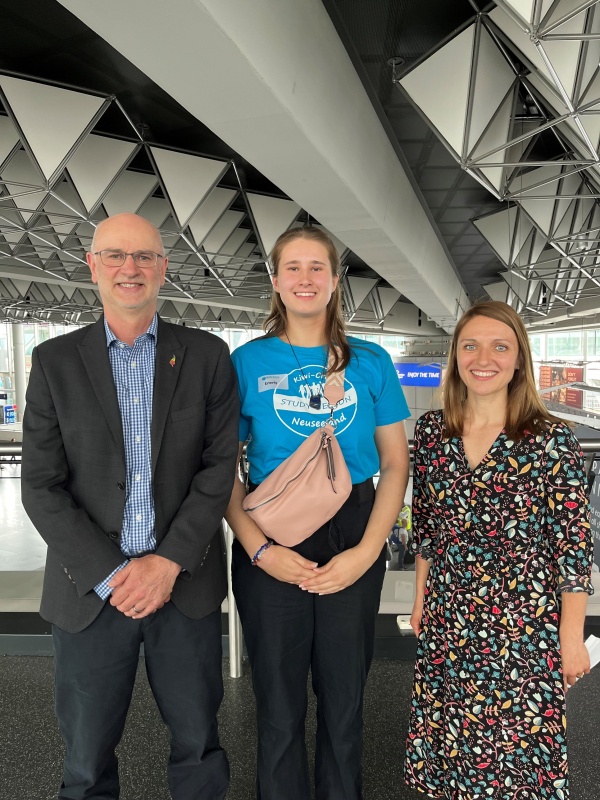
Ambassador Hawke with high school student Emely Soffel, the 2019 I AM NEW scholarship winner who was not able to travel during Covid. They are pictured here with ENZ’s Associate Director of Engagement in Germany, Olga Elli.
Olga said that Germany’s strong recovery in the high school subsector can be attributed to the experienced German agent network who have had long-standing and enduring relationships with high schools back in New Zealand.
“These agents have been building strong bridges between Germany and New Zealand for several years now, some for decades, and have made positive impacts for thousands of young people.
“They have such a deep understanding of the unique offerings that our high schools in New Zealand provide and are an invaluable service to students when trying to decide where to study,” said Olga
She added “German students love coming to New Zealand especially for the opportunity to try out subjects that aren’t typically offered at German high schools. Subjects like outdoor education, fashion design, marine biology, and food technology for example, are always really popular choices.
Ambassador Hawke mingled with the students and enjoyed hearing about their chosen schools in New Zealand. In his farewell speech to the group, he wished them a warm ‘Haere rā/farewell and said, “I invite you all to make the most of the excellent educational experience on offer in our country and also the opportunity to immerse yourself in our diverse culture. I hope you all become lifelong ambassadors for New Zealand.”
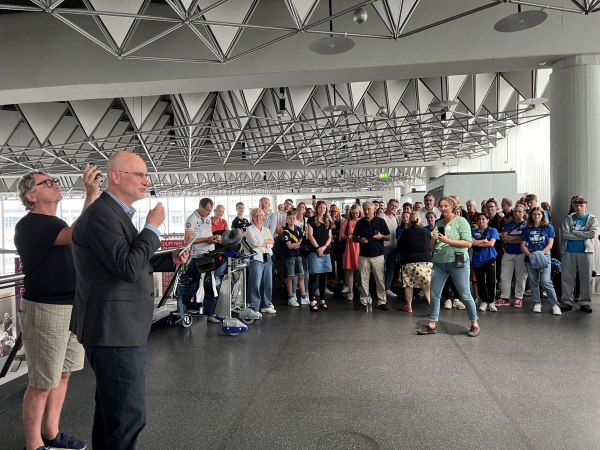
Ambassador Hawke farewells the students at Frankfurt Main Airport.
-
Māori and First Nations people connect during University of Toronto visit
18 indigenous students and two indigenous staff from the University of Toronto’s ‘First Nations House’ were invited to Aotearoa New Zealand for a week-long visit at Tirorangi Marae at the base of Mount Ruapehu in July.
The purpose of the visit was to enhance cross-cultural understanding between Māori and First Nations and Métis peoples and is significant as empowering iwi and hapū in the international education space is an important Te Tiriti obligation for ENZ, as an Aotearoa New Zealand government agency.
The visit took place during the time of ‘Puanga’ which is when the single star rises higher in the sky than the Matariki star cluster and is recognised by iwi and hapū that can’t see the Matariki cluster from their location.
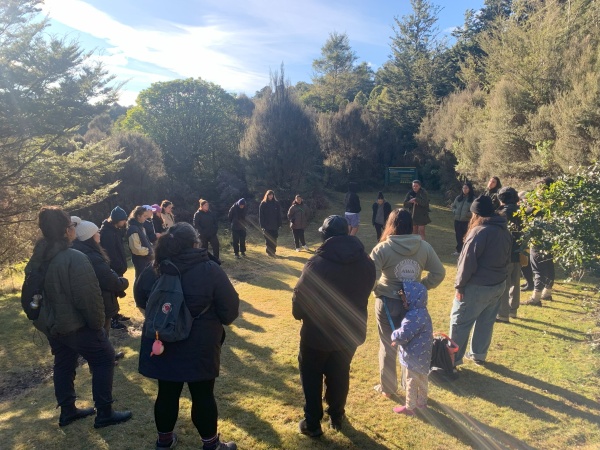
Māori and First Nations and Métis people have ’sharing circles’ as a common way to teach and learn.
The group participated in a wide range of activities in the area while staying at the marae. They were then welcomed to Te Whanganui-a-Tara by the ENZ Wellington office, visiting Te Tiriti o Waitangi at Archives New Zealand Te Rua Mahara o te Kāwanatanga and and Te Herenga Waka — Victoria University of Wellington, before finishing their trip in Whakatū (Nelson) with some adventure tourism activities.
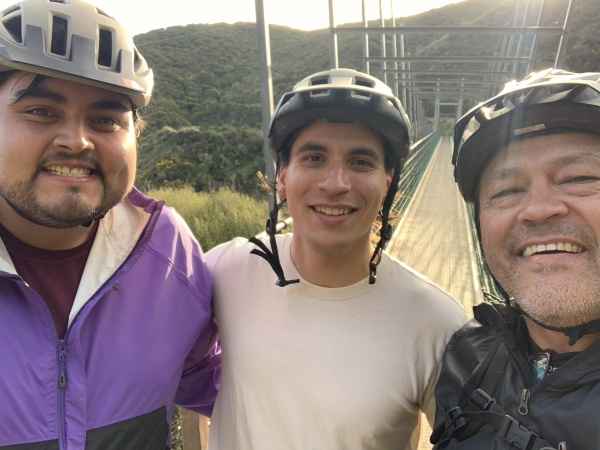
Indigenous students Kieren and Bailey from the University of Toronto sampling Wellington’s outdoors with ENZ's Craig Rofe.
The First Nations and Métis members of the group experienced what living on a marae was like and were also immersed in how a tribe engages with the environment, and how iwi businesses, local council and government agencies such as the Department of Conservation (DOC) operate in the field with iwi partnership.
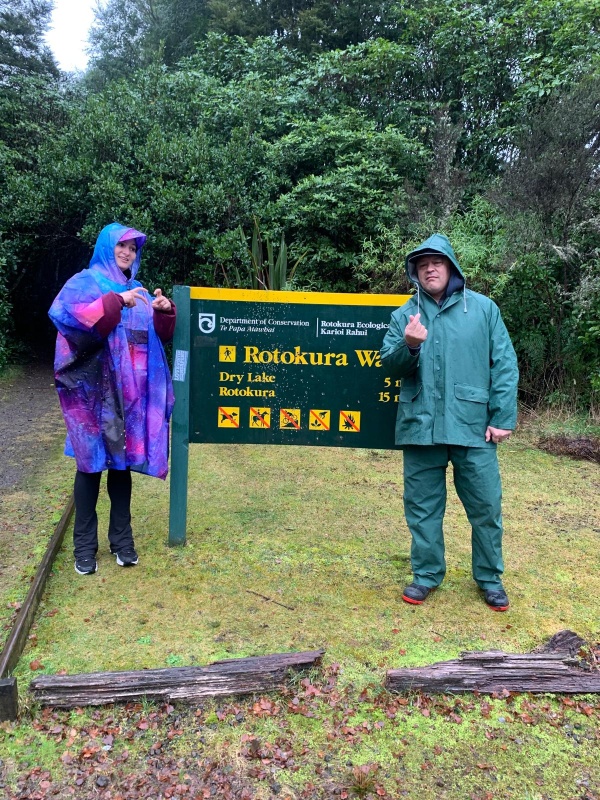
Iwi people sharing lake Rotokura’s healing power, a wāhi tapu (sacred place) for the local tribe.
Dr Craig Rofe, ENZ’s Kaitohutohu Matua Māori – Senior Advisor Māori, said that during the visit, Māori and First Nations and Métis people were able to compare the similarities and differences of their contexts to grow understand of their respective challenges and successes.
“The First Nations people’s struggles to overcome racism and prejudice resonated with tangata whenua, in particular the intentional elimination of language and the current mechanisms of revitalisation.
“Many stories shared with together showed the everyday trauma that resides in each of us and how, as indigenous people, we try to navigate these obstacles to make a better world for the next generation”, said Dr Rofe.
The trip motivated the students to connect more with their languages and culture upon their return.
Kenzie, from the Mohawk tribe said “when we meet again, I’ll be able to talk to you in my language, I’m declaring it!”.
Katherine from the Eskasoni First Nation tribe said “My experience connecting with the Ngāti Rangi revealed the transformative power of global Indigenous connections. Participating in ceremonies such as Hautapu and visiting Mount Ruapehu was particularly moving. Listening to their stories of ancestral ties to the land and taking part in traditional ceremonies that emphasized community and connection to the environment deepened my own personal understanding. This experience inspired me to initiate conversations with elders in my own community about our traditional land management practices.”
This experience also highlights the important offerings that Māori, and indeed indigenous knowledge, has to offer to international education. In particular, and not exclusively, the deep connection that indigenous peoples have with the environment and therefore natural obligation of care.

First Nation student, Alexis, discovers the origins, medicinal, spiritual and mechanical properties of harakeke (flax).
Sustainable practices and programmes can benefit from indigenous inclusion and perspectives, especially with the large-scale impacts of global warming and general pollution in many countries. The co-governance structure that Ngāti Rangi iwi and DOC work with as part of post Te Tiriti Settlement was used as an example of decolonised solutions within our New Zealand context.
There have been discussions between ENZ, Ngāti Rangi iwi, and the University of Toronto about an ongoing relationship and considering what a reciprocal engagement might look like moving forward.
Nāku te ika i hī, nāku anō i whakatau
Ki te haere, whāia i te Pare-i-te-taitonga, tērā taku ika.
This is a Ngāti Rangi iwi reference to the Ruapehu mountain being the ‘pillar post’ of the ‘Fish’ (North Island).
-
Student Voice 2013 a ‘great opportunity’
Twenty five current and former international students gathered to share their education experiences and to network with other international students.
Activities kicked off with a scavenger hunt where the teams were given a list of clues and tasks to complete at different locations around the city. The scavenger hunt included a creative photo competition to create content for our social media channels. Photos from the scavenger hunt can be found on our Facebook page.
During day two of Student Voice, workshops were held to learn more about the pathways students took to study in New Zealand, their education experiences, and their views on what can be done to improve the student experience.
Participants also fed back on the new, New Zealand Education Story brand, creating their own execution of the brand posters.
ENZ selected three current international students and one alumnus from the Student Voice group to make up the panel members for the Student Voice 2013 session at the New Zealand International Education Conference. The panel members will share their education pathway experiences and the findings from Student Voice 2013.
We are very excited to have such outstanding representatives of New Zealand education joining us.
-
NZIEC and the future of China student recruitment
Mr Zhou Chenggang is president and chief executive officer of New Oriental Education and Technology Group, one of China’s largest student recruitment agencies.

In his keynote address, President Zhou will outline some of the key trends curently shaping student recruitment from China and highlight what the future will have in store for New Zealand international student recruiters.
Alex Grace, ENZ Regional Director for Greater China and North Asia, said, “New Oriental has longstanding partnerships with schools and tertiary institutions across New Zealand. We’re looking forward to hearing President Zhou’s insights on the future of the Chinese student market and implications for New Zealand international education marketers.”
During his more than 30-year career in the education sector, President Zhou has been awarded the Leader in Chinese Educational Enterprise and Outstanding Individual in Education Industry in 2011-2013 awards, and was the 2010 Person of the Year (Tencent, Global News, and Beijing Morning Post).
Visit the NZIEC website to find out more about President Zhou and his keynote address.
President Zhou joins conference MC Miriama Kamo, Dr Jason Fox and Dr Esther Brimmer as NZIEC headline speakers. NZIEC will be held at SkyCity Convention Centre in Auckland on 22 and 23 August,
Get ready to reserve your place at the international education event of the year! Registrations for NZIEC 2017 will open on Wednesday 17 May.
-
ISANA’s guide to pastoral care success
ISANA NZ President Lesley McDonald says the breakout sessions will equip attendees with strategies, tools and resources to enhance student support at their institutions.
“Our breakout stream takes an evidence-driven approach to help providers develop strategies and inform investment in student support services,” says Lesley.
“The sessions will help delegates achieve the outcomes of the Code of Practice, while keeping the student voice at the centre of everything we do.”
The breakout sessions span international student services, advocacy, teaching and learning, and policy development, and suggest ways in which New Zealand can improve support for international students while they live and study here.
Highlights include workshops on supporting international student transitions, developing effective pastoral care programmes with your local community, and preparing for critical incidents.
Other features include Distinguished Professor Paul Spoonley talking about the possible effects of international demographic trends on the flow of students to New Zealand. An ISANA panel will also explore how individuals can be agents of change in their institutions to effect internationalisation goals, including by promoting the adoption of intercultural competencies.
ENZ has partnered with ISANA New Zealand to deliver the breakout stream at conference, with a specific focus on student experience. Find out more at www.nziec.co.nz.

